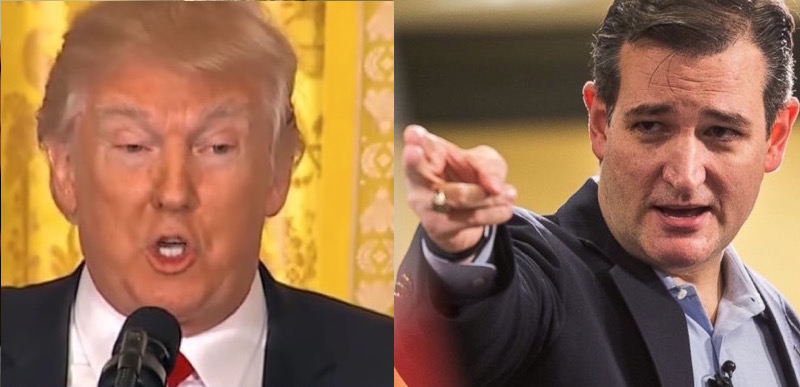As people weigh in on whether Trump can really pardon himself, Haley Byrd of the Weekly Standard got Ted Cruz to weigh in on the subject. Kinda.
Here’s what happened:
I ask Ted Cruz if he agrees with Trump that the president can pardon himself. Cruz is silent for eighteen (18!) seconds before telling reporters it’s not a constitutional area he’s studied.
— Haley Byrd (@byrdinator) June 4, 2018
Oh. Ok.
Here’s audio of the looooong silence:
Alright, folks. Here's the audio pic.twitter.com/3UhsX3f8Jh
— Haley Byrd (@byrdinator) June 4, 2018
Maybe he was just trying to ignore the question – and was prodded into answering by another reporter:
Big thanks to @rking_19 for prodding Cruz for an answer after we walked in silence waiting for him to respond for 15 seconds
— Haley Byrd (@byrdinator) June 4, 2018
Who knows. But it is surprising given how proud Cruz is of his constitutional bona fides. However, while Trump is going to only cite those scholars who agree with him, there are many who disagree – the issue has never been settled by presidential action.
One man who agrees with Trump (kinda) is Andrew McCarthy:
In any event, if we must discuss the matter then, yes, the Constitution empowers the president to pardon himself. Like any other power, the pardon power may be abused, and if Congress finds a presidential self-pardon is sufficiently abusive, it may impeach and remove the president. But that would not vitiate the pardon — it would be impossible to prosecute the president on whatever crimes had been pardoned.
So yes, he can, but that doesn’t put him above the law – there are consequences if he abuses the power.
The pardon question is factually premature in the sense that there is no allegation or indication that [the president] or those close to him have committed a crime. It is not, however, legally premature. There need not be a formal criminal charge before a president issues a pardon. After President Nixon resigned, President Ford pardoned him even though he had not been indicted. President Lincoln mass-pardoned Confederate soldiers and sympathizers, and President Carter mass-pardoned Vietnam draft evaders. Thus, the fact that special counsel Mueller has not, and may never, file criminal charges would not prevent President Trump from issuing pardons.
Including . . . a pardon for himself? Yes.
A pardon is a judicially unreviewable act of executive discretion. I think of it as an iteration of prosecutorial discretion, which is the judicially unreviewable executive decision whether to charge someone with a crime. This is a sweeping presidential authority. The only exceptions to it are obvious from the Constitution’s Pardon Clause (article II, section 2), which limits pardons to “Offenses against the United States.” That is, the president may only pardon offenses that have already occurred — he cannot grant a prospective “get out of jail free” card for future crimes; and the president may not pardon state offenses, for they are outside his jurisdiction over federal law-enforcement.
McCarthy goes on to more fully explain his position, and I think it’s a reasonable one… that Trump probably doesn’t actually hold.

